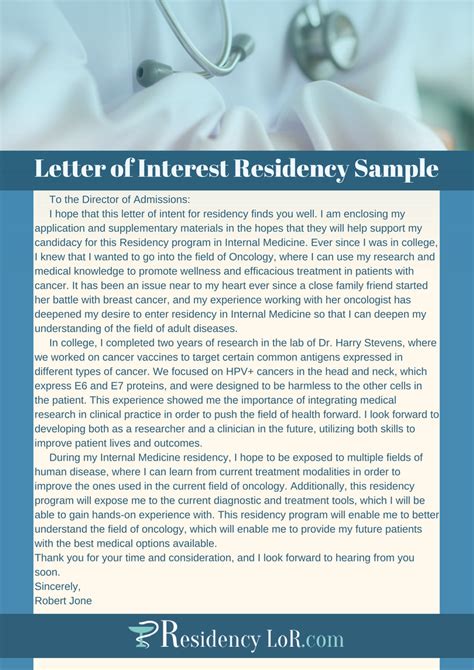How To Write A Letter Of Interest For Residency
Ronan Farrow
Apr 03, 2025 · 3 min read

Table of Contents
How to Write a Compelling Letter of Interest for Residency
Applying for a residency program is a highly competitive process. Your letter of interest (LOI), often called a personal statement, is your chance to shine and stand out from the crowd. It's your opportunity to showcase your personality, skills, and aspirations beyond the numbers on your application. This guide will walk you through crafting a compelling LOI that will impress residency program directors.
Understanding the Purpose of Your Letter of Interest
The primary goal of your LOI is to demonstrate your fit with the specific residency program and its values. It's not just about listing your accomplishments; it's about showing how those accomplishments align with the program's mission and how your personality and goals will contribute to its success. The residency program wants to know:
- Why this program? Why are you choosing them?
- What makes you unique? What are your strengths and experiences that set you apart?
- How will you contribute? What value will you add to their residency program and their patient population?
Key Elements of a Successful Letter of Interest
1. A Strong Opening: Hooking the Reader
Start with a captivating opening sentence that grabs the reader's attention. Avoid clichés and generic statements. Instead, try to highlight a specific experience or anecdote that reflects your passion for the specialty and your suitability for the program. For example, instead of "I have always been passionate about medicine," try: "Witnessing my grandmother's recovery from [illness] solidified my dedication to [specialty] and inspired my pursuit of a career dedicated to improving patient outcomes."
2. Showcasing Relevant Experiences: The Body Paragraphs
This section is crucial. Don't just list your experiences; tell stories that illustrate your skills and qualities. Use the STAR method (Situation, Task, Action, Result) to structure your anecdotes. For each experience:
- Describe the situation: Set the scene and provide context.
- Explain the task: What was your role and what needed to be done?
- Detail your action: What specific steps did you take?
- Highlight the result: What was the outcome of your actions? Quantify your achievements whenever possible.
Focus on experiences that demonstrate:
- Clinical skills: Demonstrate your competence in patient care, diagnosis, and treatment.
- Research experience: Highlight any research projects, publications, or presentations.
- Leadership and teamwork skills: Showcase your ability to collaborate effectively with colleagues.
- Communication skills: Demonstrate your ability to effectively communicate with patients and healthcare professionals.
- Commitment to the specialty: Explain why you've chosen this particular specialty and this specific residency program.
3. Connecting with the Program's Values and Mission: Alignment
Thoroughly research the specific residency program you are applying to. Identify their values, mission, and unique aspects. Explicitly connect your experiences and aspirations to these elements. Show that you understand their program and are genuinely interested in their approach to training.
4. A Strong Conclusion: Reiterating Interest and Call to Action
Summarize your key qualifications and reiterate your strong interest in the program. Express your enthusiasm and eagerness to learn from their faculty and contribute to their community. End with a professional closing statement.
Writing Style and Formatting
- Professional Tone: Maintain a formal and professional tone throughout the letter.
- Concise and Focused: Keep your letter concise and focused on the most relevant aspects of your application. Aim for a length of one to two pages.
- Proofread Carefully: Thoroughly proofread your letter for any grammatical errors, spelling mistakes, or typos.
- Format: Use a professional font (e.g., Times New Roman or Arial), 12-point font size, and 1-inch margins.
Beyond the Written Word: The Holistic Application
Remember, your LOI is just one part of your residency application. A strong application includes excellent academic records, impressive letters of recommendation, and a well-structured curriculum vitae (CV). Make sure all aspects of your application work together to create a comprehensive and compelling picture of your capabilities and suitability for the program.
By following these guidelines, you can craft a letter of interest that effectively showcases your qualifications and increases your chances of acceptance into your desired residency program. Good luck!
Featured Posts
Also read the following articles
| Article Title | Date |
|---|---|
| How To Wash Game Bags | Apr 03, 2025 |
| How To Wash Car Without Water Spots | Apr 03, 2025 |
| Howa Action For Sale | Apr 03, 2025 |
| How To Unlock A Jeep Wrangler With Keys Inside | Apr 03, 2025 |
| How Big Is 12x18 Canvas | Apr 03, 2025 |
Latest Posts
-
How Do Alexander Mcqueen Sneakers Fit
Apr 04, 2025
-
How Difficult Is The Ftce Prek 3
Apr 04, 2025
-
How Did This Get Made Jingle All The Way
Apr 04, 2025
-
How Did This Get Made Holiday In Handcuffs
Apr 04, 2025
-
How Did They Cut Diamonds Before Lasers
Apr 04, 2025
Thank you for visiting our website which covers about How To Write A Letter Of Interest For Residency . We hope the information provided has been useful to you. Feel free to contact us if you have any questions or need further assistance. See you next time and don't miss to bookmark.
